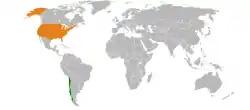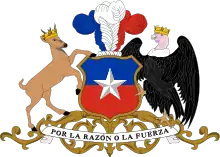Chile–United States relations
Chile–United States relations are the bilateral relations between the Republic of Chile and the United States of America. Relations, which can be traced to the nineteenth century, have improved in the period 1988 to the present to be better than any other time in history. In the late 1980s and early 1990s, the United States government applauded the rebirth of democratic practices in Chile, despite having allowed and recognized the 1973 Chilean coup d'état and aided the subsequent military regime.
 | |
Chile |
United States |
|---|---|
.jpg.webp)
Regarded as one of the least corrupt and most vibrant democracies in South America, with a healthy economy, Chile is noted as being one of the closest strategic allies of the United States in the Southern Hemisphere, along with Colombia, and remains part of the Inter-American Treaty of Reciprocal Assistance. A prime example of cooperation includes the landmark 2003 Chile–United States Free Trade Agreement. Chile is also the only South American nation that shares membership in the Organisation for Economic Co-operation and Development with the United States, as well as the only Latin American country to be included in the U.S. Visa Waiver Program.
The governments consult frequently on issues including multilateral diplomacy, security, culture and science. Recently the governments have signed agreements on education and green energy.
According to several global opinion polls, Chileans have a considerably positive opinion of the U.S., with 72% of Chileans viewing the U.S. favorably in 2015,[1] and 62% of Chileans viewing American influence positively in 2013, the highest rating for any surveyed country in Latin America.[2] According to the 2012 U.S. Global Leadership Report, 42% of Chileans approve of U.S. leadership, with 25% disapproving and 32% uncertain.[3]
U.S. Embassy
In addition to working closely with Chilean government officials to strengthen their bilateral relationship, the U.S. Embassy in Santiago provides a range of services to U.S. citizens and businesses in Chile. (Please see the embassy's home page for details of these services.) The embassy also is the focus for a number of American community activities in the Santiago area.
The public affairs section cooperates with universities and non-governmental organizations on programs, including U.S. Speaker, International Visitor, and Fulbright programs. Themes of include trade, international security, democratic governance in the region, judicial reform, law enforcement, environmental issues, and the teaching of English. The public affairs section works daily with Chilean media. It also assists visiting foreign media, including U.S. journalists, and is regularly involved in press events for high-level visitors.
Attachés at the embassy from the Foreign Commercial Service, Foreign Agricultural Service, and the Animal and Plant Health Inspection Service work closely with the hundreds of U.S. companies who export to or maintain offices in Chile. These officers provide information on Chilean trade and industry regulations and administer several programs intended to support U.S. companies in Chile.
The Consular Section of the Embassy provides services to U.S. citizens residing in Chile, currently of 19,000 people. It assists Americans voting in U.S. elections while abroad, provides U.S. tax information, and facilitates government benefit and social security payments. About 170,000 U.S. citizens visit Chile each year. The Consular Section offers passport and emergency services to U.S. tourists during their stay in Chile. It also issues about 40,000 visitor visas a year to Chilean citizens who travel to the United States.
Visa Waiver Program
In February 2014, the U.S. government officially announced that it had added Chile to the Visa Waiver Program, enabling all Chilean citizens to travel the United States without payment of a fee beginning in May and making Chile the only nation in Latin America (without count France) to currently possess such a privilege, one usually afforded to only the closest allies and partners of the U.S., such as countries of Europe, Australia, New Zealand, Japan, South Korea and Taiwan.[4][5][6]
Principal U.S. Embassy officials
- Deputy Chief of Mission – Dale B. Eppler
- Counselor for Public Affairs – Marianne Scott
- Counselor for Management Affairs – Amy Cox (acting)
- Commercial Counselor – Ellen Lenny-Pessagno
- Counselor for Economic and Political Affairs – Patrick Ventrell
- Consul General – Matthew Gillen
- Defense and Navy Attaché – Captain Reginald Baker
- Air Attaché – Colonel John Hokaj
- Army Attaché
- Legal Attaché – Ben Martinez
- DEA Agent-in-Charge
- Regional Security Officer – William Gannon
- Military Group Commander – Colonel Michael Price
- Press Attaché – Nicole Gallagher
- Cultural Attaché – Kimberly Gillen
- APHIS AREA Director – Preclearance Program Manager, Anwar Rizvi
- Agricultural Attaché – Anita Katial
- RDECOM Forward Element Command – Americas (RFEC-AME)- Héctor González
- ONR Regional Director – Bradley Goodrich
- FDA Agency Director – Julio Salazar
- National Geospacial Agency Chief – John Roa
- AFOSR/SOARD – Dr. Brett Pokines[7]
Diplomatic missions
The U.S. Embassy and Consulate are located in Santiago. The embassy of Chile is in Washington, D.C. and the consulates are in Chicago, Houston, Los Angeles, Miami, New York City and San Francisco.
See also
- Chilean Americans
- Letelier case
- United States intervention in Chile
References
- Pew Global Indicators Databse: Chile.
- 2013 World Service Poll BBC
- U.S. Global Leadership Project Report - 2012 Archived 2015-09-24 at the Wayback Machine Gallup
- U.S. adds Chile to Visa Waiver Program
- Chile ingresa al Programa de Exención de Visa en EE.UU.
- "Visa Waiver Program". Archived from the original on 2015-09-05. Retrieved 2017-06-24.
- "Embassy of the United States – Santiago, Chile – Key Officers". chile.usembassy.gov. Retrieved August 26, 2020.
![]() This article incorporates public domain material from the United States Department of State website https://2009-2017.state.gov/r/pa/ei/bgn/1981.htm.
This article incorporates public domain material from the United States Department of State website https://2009-2017.state.gov/r/pa/ei/bgn/1981.htm.
Further reading
- Burson, Phyllis J. "Chilean Americans." Gale Encyclopedia of Multicultural America, edited by Thomas Riggs, (3rd ed., vol. 1, Gale, 2014), pp. 479–490. online
- Evans, Henry Clay. Chile and its Relations with the United States (Duke UP, 1927).
- Francis, Michael J. The limits of hegemony: United States relations with Argentina and Chile during World War II (U of Notre Dame Press, 1977)
- Mares, David R. The United States and Chile : coming in from the cold (2001) online
- Morley, Morris, and Chris Mcgillion. "Soldiering On: The Reagan Administration and Redemocratisation in Chile, 1983–1986." Bulletin of Latin American Research (2006) 25#1 pp: 1-22.
- Morley, Morris, and Chris McGillion. Reagan and Pinochet: The Struggle over U.S. Policy toward Chile (Cambridge University Press, 2015) 338 pp.
- Pike, F. B. Chile and the United States: 1880–1962 (U of Notre Dame Press, 1963) online
- Sigmund, Paul E. The United States and Democracy in Chile (Johns Hopkins Univ Press, 1993) online
- Whitaker, Arthur P. The United States and the southern cone: Argentina, Chile, and Uruguay (1976) online
External links
| Wikimedia Commons has media related to Relations of Chile and the United States. |
